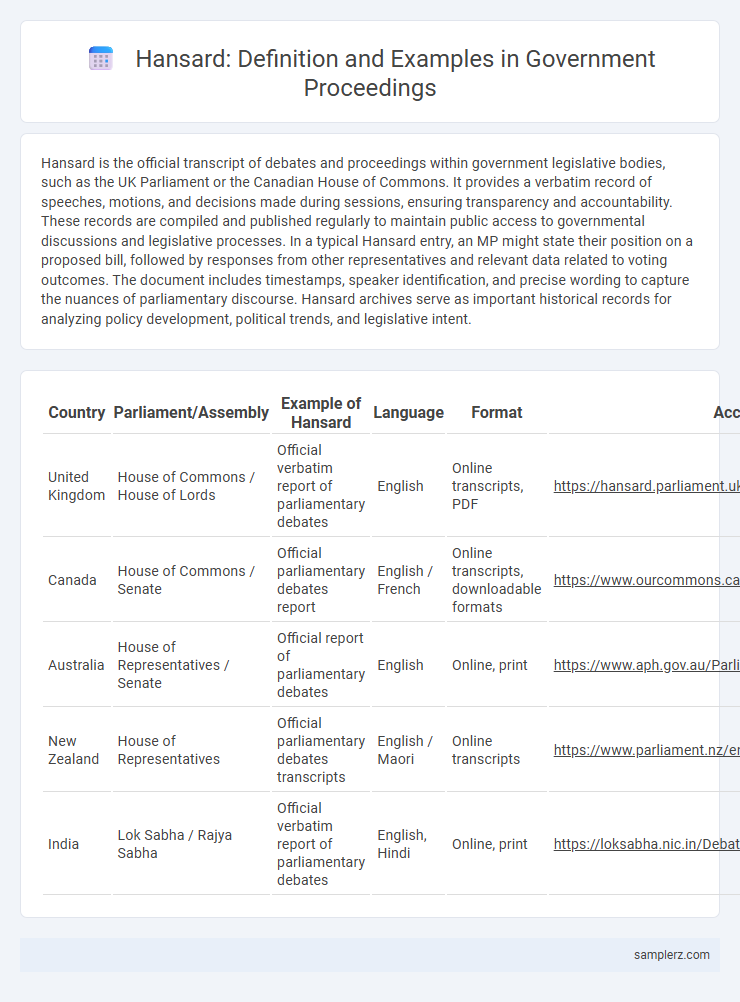Hansard is the official transcript of debates and proceedings within government legislative bodies, such as the UK Parliament or the Canadian House of Commons. It provides a verbatim record of speeches, motions, and decisions made during sessions, ensuring transparency and accountability. These records are compiled and published regularly to maintain public access to governmental discussions and legislative processes. In a typical Hansard entry, an MP might state their position on a proposed bill, followed by responses from other representatives and relevant data related to voting outcomes. The document includes timestamps, speaker identification, and precise wording to capture the nuances of parliamentary discourse. Hansard archives serve as important historical records for analyzing policy development, political trends, and legislative intent.
Table of Comparison
| Country | Parliament/Assembly | Example of Hansard | Language | Format | Access |
|---|---|---|---|---|---|
| United Kingdom | House of Commons / House of Lords | Official verbatim report of parliamentary debates | English | Online transcripts, PDF | https://hansard.parliament.uk/ |
| Canada | House of Commons / Senate | Official parliamentary debates report | English / French | Online transcripts, downloadable formats | https://www.ourcommons.ca/en/hansard |
| Australia | House of Representatives / Senate | Official report of parliamentary debates | English | Online, print | https://www.aph.gov.au/Parliamentary_Business/Hansard |
| New Zealand | House of Representatives | Official parliamentary debates transcripts | English / Maori | Online transcripts | https://www.parliament.nz/en/pb/hansard-debates/ |
| India | Lok Sabha / Rajya Sabha | Official verbatim report of parliamentary debates | English, Hindi | Online, print | https://loksabha.nic.in/Debates/Debates.aspx |
Introduction to Hansard in Parliamentary Proceedings
Hansard serves as the official verbatim report of parliamentary proceedings, meticulously documenting speeches, debates, and votes within the legislature. This authoritative record ensures transparency and accountability by providing an accurate historical account of government discussions and decisions. By preserving detailed transcripts, Hansard supports informed public engagement and scholarly research in legislative processes.
Historical Background of Hansard Records
Hansard records date back to the early 19th century, originating from the British Parliament's need to accurately document debates and proceedings. Named after printer Thomas Curson Hansard, these verbatim transcripts preserve legislative discussions and decisions, providing an essential historical archive. The establishment of Hansard set a precedent for transparency and accountability in parliamentary governance worldwide.
Structure and Function of Hansard Transcripts
Hansard transcripts provide a verbatim record of parliamentary debates, structured into date-stamped sittings, speaker attributions, and segmented speeches for clarity and reference. Each entry includes detailed annotations such as member names, roles, and interjections to ensure transparent accountability and accurate historical documentation. These transcripts serve critical functions in legislative scrutiny, enabling public access to government proceedings and preserving the integrity of parliamentary discourse.
Example: Hansard in Legislative Debates
Hansard serves as the official transcript of legislative debates, providing an accurate and comprehensive record of parliamentary proceedings. In the UK Parliament, Hansard captures verbatim speeches, motions, and questions, ensuring transparency and accountability in government decision-making. This detailed documentation supports public access to legislative discussions and facilitates historical research on policy development.
Role of Hansard in Question Time Sessions
Hansard plays a crucial role in Question Time sessions by providing an official, verbatim record of the questions posed by opposition members and the answers delivered by government ministers. This detailed transcript ensures transparency and accountability by documenting the precise language used during parliamentary debates and holding officials to their statements. Researchers, journalists, and the public rely on Hansard to analyze government performance and policy discussions accurately.
Hansard as a Reference for Policy Decisions
Hansard serves as an authoritative reference in government proceedings, providing verbatim transcripts of parliamentary debates that ensure transparency and accountability. Policymakers rely on Hansard to review historical discussions, assess legislative intent, and inform evidence-based decisions. Access to detailed records in Hansard enhances the formulation and evaluation of public policies by capturing diverse viewpoints and official arguments.
Notable Instances Recorded in Hansard
Hansard, the official report of parliamentary debates, documents critical moments such as Winston Churchill's poignant speeches during World War II and the detailed debates on the UK's entry into the European Economic Community. It also records landmark exchanges like the 1979 vote of no confidence that led to the fall of the Labour government. These notable instances provide valuable insights into political decision-making and legislative history.
Accessibility of Hansard to the Public
Hansard transcripts provide verbatim records of governmental debates and proceedings, ensuring transparency and accountability in parliamentary processes. These official documents are accessible to the public through digital platforms, government websites, and library archives, enabling citizens to review legislative discussions and decisions. Accessibility enhancements include searchable databases, downloadable formats, and real-time streaming, which support informed public participation and democratic engagement.
Hansard’s Impact on Government Transparency
Hansard serves as the official verbatim report of parliamentary debates, providing an accurate and accessible record of government proceedings. Its detailed transcripts enhance government transparency by allowing citizens, journalists, and researchers to scrutinize legislative discussions and decisions. By maintaining a public archive of debates, Hansard strengthens democratic accountability and fosters trust in governmental processes.
Future Developments in Hansard Reporting
Future developments in Hansard reporting emphasize enhanced digital integration, including real-time transcription and AI-powered summarization to improve accessibility and accuracy. Advanced speech recognition technology is expected to reduce transcription errors and expedite the publication process, enabling timely public access to parliamentary debates. Innovations also aim to incorporate multimedia elements and interactive features within Hansard platforms, fostering greater transparency and engagement in government proceedings.

example of Hansard in proceeding Infographic
 samplerz.com
samplerz.com